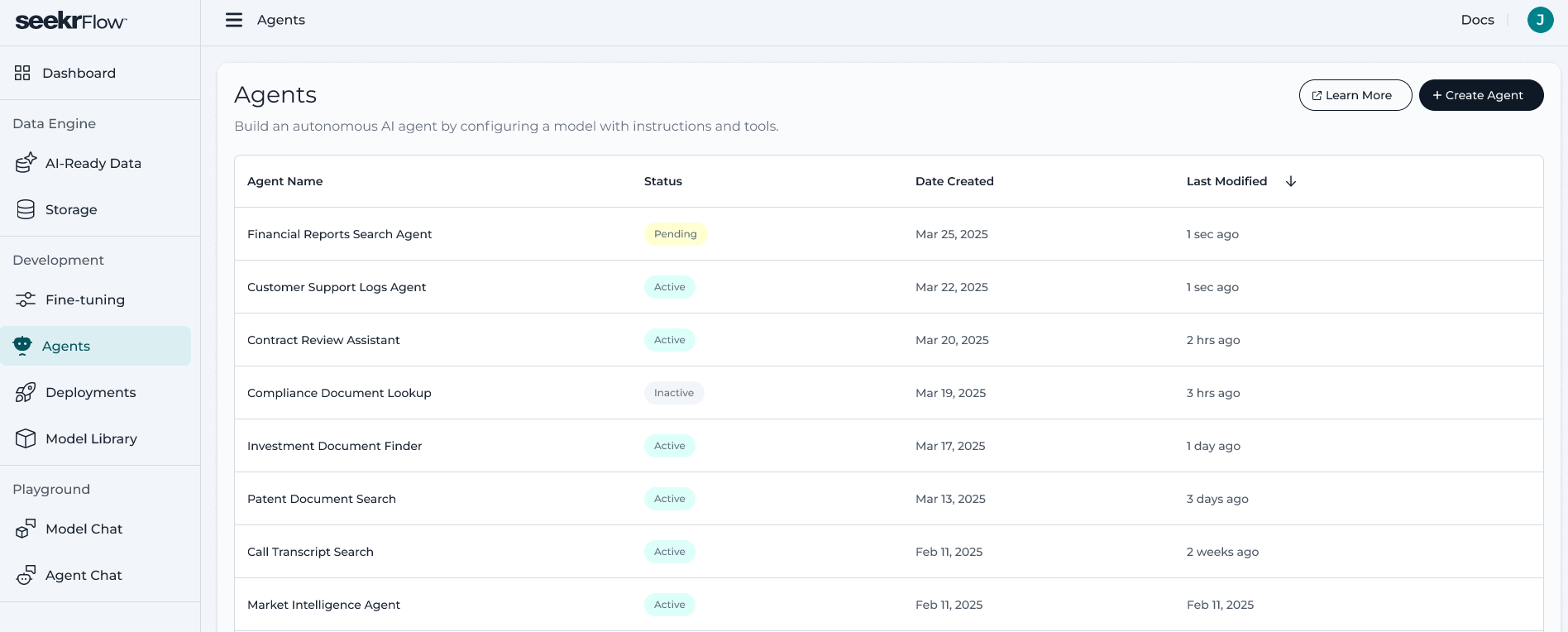Agents
Seekrflow Agents are AI systems that autonomously accomplish tasks by reasoning through problems and taking action. They can be configured to accomplish everything from executing simple workflows to pursuing complex, open-ended objectives.
Seekr provides composable building blocks that enable you to build agents. This guide walks through those components and how they work together to form a complete agentic platform.
Building agents involves assembling and orchestrating core primitives—models and tools—that can dynamically reason through problems and take actions to accomplish specific goals.
Overview
You can create and manage Seekrflow Agents in two ways:
- Seekrflow UI
- Seekrflow Agents Python SDK
The Seekrflow UI is a no-code interface that enables non-technical users to create, manage, and test agents—it's a great place to get started with agents and prototype ideas.

The Seekrflow agents SDK is a fully-featured Python SDK that allows you to build complex reasoning use cases (or generic ones) via code.
Both are explained in their corresponding sections.
Seekrflow Agent Primitives
A primitive is a basic building block used to construct an agent. Seekrflow agents consist of two core primitives (with more to come!):
Models- A Large Language Model (LLM) serves as the agent's cognitive engine, providing the reasoning capabilities needed to understand tasks, determine the best course of action, and output quality results.
- The Seekr advantage: Seekr supports the usage of fine-tuned LLMs via its data engine
Alternatively, customers can choose from any of its supported LLMs
Tools- Agent Tools are modular components that extend an agent's capabilities—enabling it to take actions, access external systems, or query your knowledge store—so the agent can complete tasks beyond its built-in reasoning.
- Today, Seekr supports the usage of three tools: Web Search, File Search, and Code Interpreter (more to come!)
Using these core primitives, you can build a Seekrflow agent to solve your basic or complex use case.
Available tools
Currently, the Agents API supports the following tools:
- FileSearch: A knowledge augmentation tool that processes and searches files.
- WebSearch: A knowledge augmentation tool that searches across multiple web sources and search engines for real-time information.
- Code Interpreter: An execution tool that can take relevant parts of your context and simple python code
The SeekrFlow agent advantage
Seekr's API delivers a fully hosted infrastructure and unified framework, letting you fine-tune, deploy, and run advanced models—all within your own secure environment. Unlike other frameworks, which require stitching together multiple third-party services and external dependencies, Seekr keeps your data and completions ringfenced, supporting air-gapped and on-premise deployments for maximum control and compliance.
Users have the ability to create and plug in custom fine-tuned or RAG models within our agentic framework, using dedicated endpoints. Seekr is purpose-built for extensibility and enterprise needs, giving you a robust, secure base to grow with.
Updated 7 days ago
